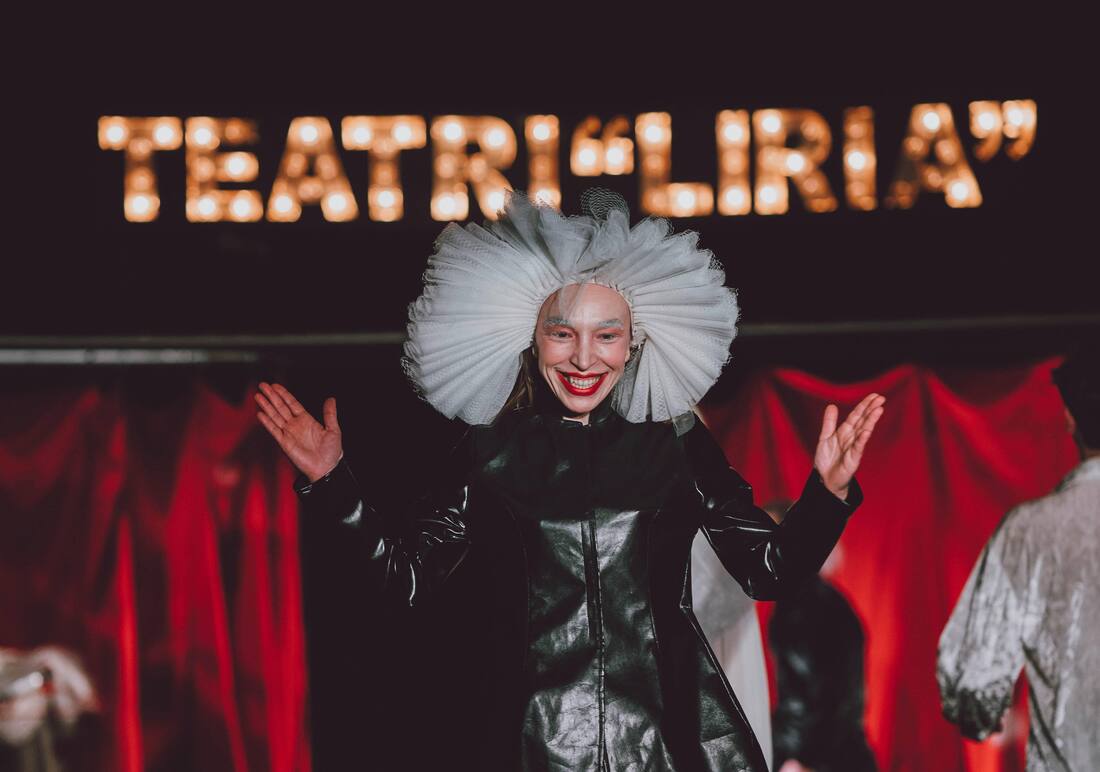Review by Fatlinda DakuA wake-up call from the dead
There is something special about theatre scenes that take place in the audience's space. They make you feel like you are part of the show too. Technically and spiritually. They break the routine of normality and prepares you for a journey that will not be ‘normal’. And yes, normality it’s a subjective experience that everyone understands differently. But Erson Zymberi's production of the work of Beqir Musliu takes our history, our myths, our traditions, our political situation - which is accepted as it is (as 'normal' in this case) - and left us, the audience, with many "What if’s?" The setting is that of a theatre named “Liria ", which means freedom in Albanian. Seven actors play nine mystical creatures. Their costume designs are a mix of traditional and modern elements. The actors don’t only speak to us through their actions on stage, they speak to us through the strange and unique mix of music, songs, and dance that characterized this show. The songs had very powerful lyrics that together with the narrator, played mostly by Arta Selimi, played a crucial role in this performance. What made this play even more special for me is the fascinating interpretation of Shengyl Ismaili in the role of mother in all dramas. I get goosebumps when I think about it. During the show, there were sometimes some pauses when the mother looked at the audience and we got lost in her eyes full of pain for Halil, Fatima, and Rexha. Those two or three-second pauses were so strong that they will stay in the memory of many of us in the audience for a long time. It also proved that sometimes the most powerful communication is through facial expression, something the actors in this performance did amazingly well. Zymberi's direction made us travel through the four dramas of Musliu that I believe everyone who loves Albanian literature knows. The one about "Who brought Doruntina?" but this time it was about Fatime, the one with Halil Garria, the one about Rexha with his tragic death by his horse and about "Shtriganin e Gjel-Hanit". The show takes us back and forth from their reality to our reality and mixed it with feelings of nostalgia for a time that we, the audience, did not experience, but only read or heard about it. It felt like they were giving us glimpses of what ‘we’ used to be, and of what we should be. Throughout the show, the author was playing with our realities and how we see things. At moments we were deep in the past reality,’ then the narrator took us back to our reality. Many sequences were repeated, but always with a different element letting us understand what it would be like if the myths were different. It felt like the dead people in these myths were the whistleblowers of our modern society. This made the whole show very intriguing and I could hardly wait to see what would happen next, what would change in this myth, and how the actors will play with it. A connecting point of these dramas would be that all the events in this performance openly display the complexity of being held hostage to the given word and our traumas as a people during this history of constant struggle for the homeland and undoubtedly the suffering of the mother. It all starts with the myth of Halil Garria who wakes up from the grave and goes with his wooden horse, to meet Fatime, his only sister to whom he has promised that alive or dead he will go to take her home to her mother and then continue with Rexha who finds death from his horse, and the mourning of her mother asking him to wake up because, with his death, he metaphorically closed the door of the house. Zymberi's production allowed us to journey to the past through Albanian historical myths. It is a call for awakening, for change, and for a confrontation with the brutal reality that we are living through so calmly and which we accept as something normal. Even the song with which the whole show ends lets us know that all of us in one way or another have failed to make this place as we promised those who died for freedom. If Halil Garria kept his word and got up to pick up his sister and send her to his mother, maybe we too could wake up, keep our word and make this place better for us first and for future generations. So, yes, the dead people in this performance were the whistleblowers of our society this time, but what if next time they forget about us, as we did about them? Author: Beqir Musliu /directed by: Erson Zymberi
0 Comments
Leave a Reply. |
Kosovo Theatre ReviewsReviews and creative responses to theatre productions in Kosovo Archives
November 2022
Categories |

 RSS Feed
RSS Feed
